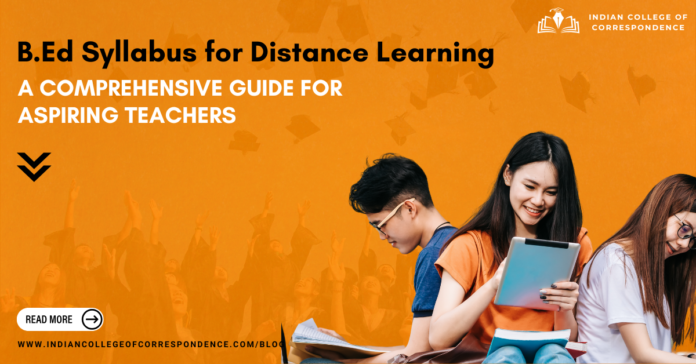The Bachelor of Education (B.Ed) program is one of the most sought-after courses for aspiring educators, designed to enhance teaching skills and foster a deeper understanding of educational methodologies. With the increasing demand for flexible learning options, many universities now offer the B.Ed program through distance learning, enabling students to pursue their teaching aspirations without disrupting their existing commitments.
This article provides a comprehensive guide to the B.Ed syllabus for distance learning, focusing on its structure, core components, benefits, and career prospects. Whether you are a working professional or a homemaker, this guide will help you understand how the B.Ed syllabus is tailored to meet the needs of distance learners.
Why Choose a Distance Learning B.Ed Program?
Distance learning has emerged as a popular mode of education, especially for professional courses like B.Ed. Here’s why it’s a great option:
- Flexibility: Study at your own pace without attending regular classes.
- Affordability: Distance learning programs are often more cost-effective than on-campus courses.
- Convenience: Ideal for working professionals or those with family responsibilities.
- Wide Reach: Accessible to students from remote areas who may not have access to quality educational institutions nearby.
The Indian College of Correspondence, a renowned educational consultancy, plays a pivotal role in guiding students toward selecting the best distance learning B.Ed programs that suit their needs.
B.Ed Syllabus for Distance Learning: An Overview
The B.Ed syllabus for distance learning is carefully designed to balance theoretical knowledge and practical application. While the content remains similar to regular B.Ed programs, it is adapted to suit the distance education format.
The syllabus is typically divided into four semesters over two years, covering core education theories, teaching methodologies, and practical training.
Semester 1: Foundations of Education
The first semester introduces the fundamental concepts of education and teaching. Key subjects include:
- Childhood and Growing Up
- Understanding the psychological and emotional development of children.
- Theories of child development and their application in teaching.
- Contemporary India and Education
- Exploring the socio-economic and cultural aspects of education in India.
- Understanding educational policies and their impact.
- Learning and Teaching
- Introduction to various learning theories and teaching practices.
- Role of motivation and classroom management in effective teaching.
Semester 2: Pedagogical Skills
The second semester focuses on building pedagogical expertise in specific subjects.
- Pedagogy of School Subjects I
- Strategies for teaching core subjects such as Mathematics, Science, and Languages.
- Subject-specific teaching aids and methods.
- Assessment for Learning
- Techniques for evaluating student performance.
- Designing tests and feedback mechanisms to improve learning outcomes.
- ICT in Education
- Integration of technology in teaching.
- Use of digital tools for creating interactive learning experiences.
Semester 3: Practical Training and Specialized Learning
The third semester emphasizes practical exposure and specialization.
- School Internship
- Distance learners participate in internships at nearby schools to gain hands-on teaching experience.
- Observing and practicing classroom management techniques.
- Gender, School, and Society
- Addressing gender disparities in education.
- Promoting inclusivity and equality in classrooms.
- Special Education and Inclusive Practices
- Teaching students with special needs.
- Adapting the curriculum for diverse learners.
Semester 4: Research and Advanced Concepts
The final semester includes advanced topics and research-oriented learning.
- Knowledge and Curriculum
- Examining the principles of curriculum design.
- Understanding how cultural and societal factors influence education.
- Educational Research
- Conducting small-scale research projects to address real-world educational challenges.
- Analyzing and presenting findings effectively.
- Dissertation/Project Work
- Completing a project or dissertation as a culmination of the course.
Key Features of the B.Ed Syllabus for Distance Learning
- Blended Learning: The curriculum incorporates online classes, self-study materials, and practical training.
- Interactive Study Materials: Distance learners receive study guides, recorded lectures, and e-books to facilitate learning.
- Flexibility in Assignments: Students can submit assignments and projects online, making it convenient for working professionals.
- Focus on Practical Training: Despite being a distance program, the B.Ed syllabus includes internships and teaching practice to ensure real-world exposure.
Benefits of Understanding the B.Ed Syllabus
- Structured Learning Path: Knowing the syllabus helps students plan their studies effectively.
- Skill Development: The curriculum enhances teaching skills, classroom management, and subject-specific expertise.
- Career Opportunities: Completing a B.Ed program makes you eligible for teaching positions in schools, coaching centers, and educational consultancies.
How the Indian College of Correspondence Helps
Choosing the right institution for your B.Ed distance learning program can be overwhelming. This is where the Indian College of Correspondence, one of the best educational consultancies in India, steps in.
- Guidance on University Selection: The consultancy helps you identify the most suitable universities offering a well-structured B.Ed syllabus.
- Application Assistance: They streamline the admission process, ensuring you don’t miss any important deadlines.
- Support Throughout the Course: From study materials to exam preparation, the Indian College of Correspondence provides continuous support to distance learners.
Career Opportunities After Completing a B.Ed Distance Learning Program
Graduates of the B.Ed program can explore various career paths, including:
- Teaching in Schools: Become a primary or secondary school teacher in government or private institutions.
- Educational Consultant: Work as an advisor for schools or educational institutions.
- Curriculum Designer: Develop educational materials and lesson plans for schools or publishing houses.
- Online Tutor: Leverage digital platforms to teach students worldwide.
Conclusion
The B.Ed syllabus for distance learning is a well-rounded curriculum that prepares aspiring educators to excel in their teaching careers. With its blend of theoretical knowledge and practical training, the program ensures that distance learners are not at a disadvantage compared to regular students.
To embark on your journey toward becoming a qualified educator, seek expert guidance from the Indian College of Correspondence, the best educational consultancy for distance learning programs. They will help you choose the right course and provide support throughout your academic journey.
By understanding the B.Ed syllabus and leveraging the flexibility of distance learning, you can achieve your dream of shaping the future through education.



